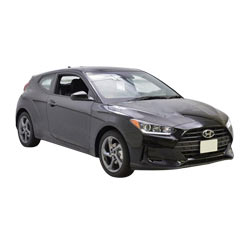2019 Hyundai Veloster Trim Levels with Comparisons & Configurations.
When it comes to cars, James Murdock has the real-world experience to back it up. With an economics degree and over 20 years running the family dealership, he's managed it all - from sales to service and marketing. His role is to provide his expert opinion on vehicle performance and value. He meticulously fact checks all features and data with vehicle manufacturers to ensure the upmost accuracy.
A lengthy list of improvements have been made to the redesigned 2019 Hyundai Veloster. Not only did Hyundai refine the small hatchback’s exterior styling, but it also improved the Veloster’s driving dynamics. A greater number of advanced safety technologies are now available as well. Fortunately, the new Veloster only has a slightly higher MSRP than the previous model.
While the 2019 Hyundai Veloster has received major updates, its beloved three-door design remains unchanged. Hyundai also continues to back the Veloster with a class-leading, 100,000-mile powertrain warranty. Let’s find out how the new Veloster trims compare to each other.Compare the 2019 Hyundai Veloster Base 2.0 vs 2.0 Premium Trims. What is the difference?
Prices for the base 2.0 trim start at an economical $18,500. It’s genuinely a great value. Power comes from a new four-cylinder engine, which produces a bit more power. It’s rated to generate 147 horsepower and 132 pound-feet of torque. While a six-speed manual stick is standard, a six-speed automatic transmission is available as an option. Every new Veloster features a front-wheel-drive system. Drive Mode Select enables you to choose from Normal, Sport, and Smart settings.
A lot of buyers will appreciate the base Veloster 2.0’s cool exterior styling. It comes standard with a sporty set of 17-inch alloy wheels and a center-exit exhaust. You’ll also notice the base Veloster 2.0’s roof spoiler, which features an integrated LED brake lamp. Other exterior highlights include a shark fin antenna, tinted glass, and heated side mirrors. A total of six paint colors are available for the base model, including Sunset Orange and Racing Red.
While the base Veloster 2.0’s interior isn’t designed to wow drivers, it has a more quality feel than before. Premium cloth upholstery comes standard. To cut down on costs, Hyundai equips the base Veloster 2.0 with a manual driver’s seat. Meanwhile, a tilt-and-telescoping steering wheel seeks to accommodate drivers of varying sizes.
In comparison to the previous base Veloster, there’s a better selection of high-tech features inside the new model. Apple CarPlay and Android Auto come standard with the base Veloster’s 7.0-inch touch screen. While on the road, steering-wheel-mounted audio controls enable you to operate the six-speaker stereo system. Some of the other standard features include hands-free Bluetooth phone connectivity, a rearview camera with dynamic guidelines, and two USB ports.
The base Veloster 2.0 now benefits from some convenient driver-assist technologies. While the forward collision mitigation system can trigger your brakes when approaching stopped vehicles, lane-keep assist helps prevent highway drifting. Driver attention warning is another one of the base Veloster 2.0’s valuable safety features. A tire pressure monitor and four-wheel disc brakes come standard as well.
For $22,750, you can step up to the Veloster 2.0 Premium. While performance remains the same, you can take advantage of the 2.0 Premium trim’s additional creature comforts. The heated front seats feature leather bolsters. Automatic climate control and a sunroof also help create a more relaxing ride.
More high-tech goodies are found on the Veloster 2.0 Premium as well. Proximity entry with push-button start enables you to unlock the doors with your fingertip. Meanwhile, an eight-speaker Infinity sound system with SiriusXM satellite radio makes the mood more exciting. You’ll also enjoy Blue Link, which enables you to perform functions such as remotely cranking the engine and vehicle tracking. Other upgrades include an 8.0-inch touch screen, a 4.2-inch driver information display, and a wireless charging pad.
To bolster safety, Hyundai equips the Veloster 2.0 Premium with blind-spot monitoring. Styling is enhanced by a more attractive set of 18-inch alloy wheels. A six-speed automatic transmission comes standard on the 2.0 Premium trim.
Compare the 2019 Veloster 2.0 Premium vs Turbo R-Spec Trims. What is the difference?
The Turbo R-Spec trim brings more performance to the table. It comes outfitted with a boosted four-cylinder engine, which kicks out 201 horsepower and 195 pound-feet of torque. As soon as you step on the gas, expect to experience stronger acceleration. Because the Turbo R-Spec trim is geared towards driving enthusiasts, Hyundai pairs it exclusively with a six-speed manual gearbox. A B&M Racing sport shifter further optimizes performance.
Sharper handling also helps make the Veloster Turbo R-Spec more engaging to drive. It comes equipped with sports-tuned steering and Michelin Pilot Sport performance tires. Active Engine Sound technology adds to the excitement of driving the Veloster Turbo R-Spec.
The Veloster Turbo R-Spec’s exterior styling matches its sportier performance. It features a mesh grille and a unique set of 18-inch wheels. Red accents also help the Turbo R-Spec trim to stand out. LED headlamps and LED taillights come standard.
On the inside, sport cloth upholstery and alloy pedals give the Veloster Turbo R-Spec a more exciting character. Upgraded features, such as the Infinity premium sound system and the larger 8.0-inch touch screen, come standard. Keep in mind that blind-spot monitoring and forward collision mitigation are not available on the performance-focused R-Spec trim.
Compare the Veloster Turbo R-Spec vs Turbo Trims. What is the difference?
The Turbo trim is essentially a more powerful version of the Premium trim. However, a perforated leather steering wheel gives it a more luxurious feel. Power lumbar for the driver’s seat also provides more comfort. In contrast to the manual-equipped Turbo R-Spec trim, it comes equipped with an EcoShift dual-clutch automatic transmission. You’ll receive all of the available safety technologies.
In regard to exterior appearance, the Veloster Turbo is very similar to the Veloster R-Spec. However, it features an exclusive wheel design. Side mirrors with LED turn signal indicators further separate the Veloster Turbo.
Compare the Veloster Turbo vs Turbo Ultimate Trims. What is the difference?
If you desire a unique combination of performance and luxury, check out the Veloster Turbo Ultimate. This range-topping model allows you to choose between a six-speed manual transmission and a dual-clutch automatic transmission.
On the inside, you’ll find luxurious amenities not available on the other trims. Leather seating surfaces accentuate the Veloster Turbo Ultimate’s higher quality interior. Built-in navigation is included as well.
Hyundai adds an extra number of driver-assist technologies to the Turbo Ultimate trim. While pedestrian detection provides more security in heavily populated areas, smart cruise control keeps you traveling with the flow of traffic. Meanwhile, a heads-up display puts driving information closer to your eye level. Rain-sensing wipers also come equipped on the Veloster Turbo Ultimate.
The Veloster Turbo Ultimate and the Veloster Turbo look strikingly similar to each other. However, a black two-tone roof is optional on the Veloster Turbo Ultimate.
Compare the 2019 Veloster Turbo Ultimate vs Veloster N Trims. What is the difference?
The Veloster N will debut later in the year. It’s designed for the drivers who may decide to hit the track. Hyundai equips it with a racy turbocharged engine, which pushes out 250 horsepower. However, an optional Performance package raises the Veloster N’s output to 275 horsepower. A six-speed manual gearbox with rev-matching elevates the hatchback’s fun factor.
To bolster handling, Hyundai fits the Veloster N with a limited-slip differential and a stiffer track-tuned suspension. Meanwhile, activating the Veloster N’s Sport+ mode enhances throttle response and gives the exhaust system a more aggressive sound.
There are some special appearance upgrades on the Veloster N, including large-bore exhaust outlets and an aerodynamic rear spoiler. Furthermore, no other Veloster trim offers an exclusive Performance Blue paint color.
When sitting in the Veloster N, you’ll notice a few race-inspire features. Contrast seat stitching and a checkered flag on the paddle shifters help excite drivers. While Hyundai’s advanced safety technologies are not available on the Veloster, you’ll enjoy features like the Infinity premium sound system.
Final Thoughts
If you’re looking to spend your money wisely, take a serious look at the base Veloster 2.0. Critics find it to be an even more appealing bargain than before. It’s stylish, good on gas, and attractively priced. Popular features, such as Hyundai’s best-in-class infotainment system, come standard. You’ll also benefit from important driving aids like forward collision mitigation and driver attention monitoring.
Although the Veloster 2.0 Premium is more expensive, its upgraded features are worth the price jump. The more powerful Infinity sound system and blind-spot monitoring are definite highlights.
Drivers seeking more thrills while behind the wheel will enjoy the Turbo R-Spec trim. It’s only around $150 more expensive than the less powerful Veloster 2.0 Premium. Test drivers rave about its fun-to-drive nature. Because of the Veloster Turbo R-Spec’s manual gearbox, you lose out on some of the available safety technologies.
While the Veloster Turbo is nice, you’re better off stepping up to the more luxurious Veloster Turbo Ultimate. Most people won’t regret spending the extra $1,200. Remember, the Turbo Ultimate trim provides leather seating and additional safety tech.
The high-output Veloster N is especially exciting. This “hot hatch” competes on an elite level. For an MSRP of $26,900, it’s hard to beat. However, fuel economy is a tad lower.
2019 Hyundai Veloster Key Features
Hyundai offers the new Veloster with three different engines. While models equipped with the base engine aren’t fast, they will return good fuel economy. However, the turbocharged engine is almost just as efficient. Both engines can return a combined 30 mpg on regular gasoline. Fuel economy drops to a combined 25 mpg on the very powerful Veloster N.
Hyundai’s Blue Link system is a feature worth getting. It better connects you to the vehicle. Parents who have a teen driver at home will appreciate Blue Link’s ability to provide speed alerts. This feature can also remotely adjust the climate control system, contact emergency personnel, and check maintenance timing.


